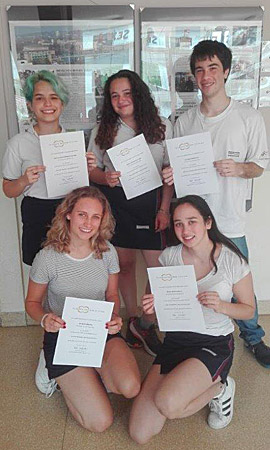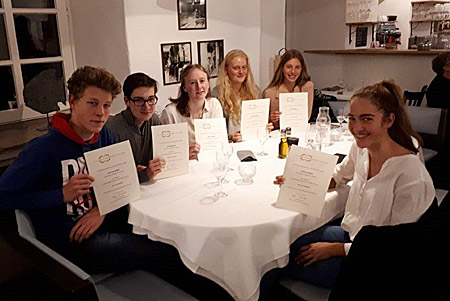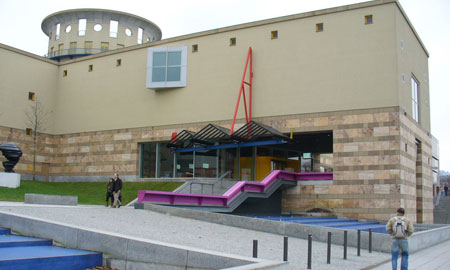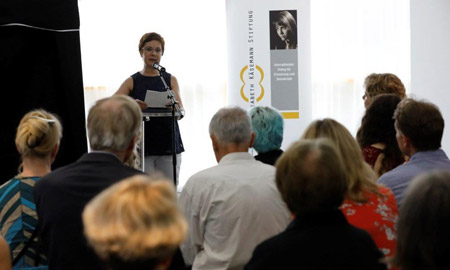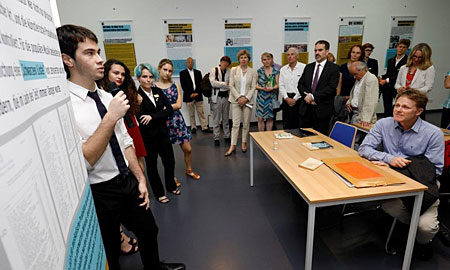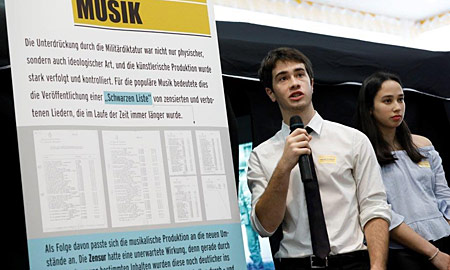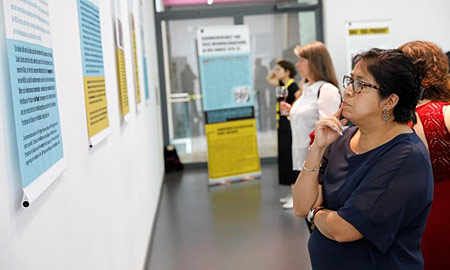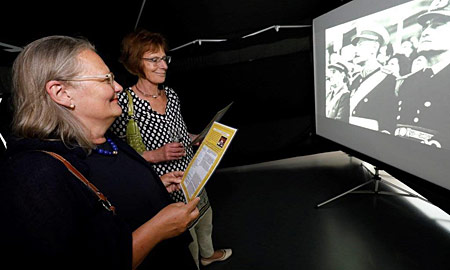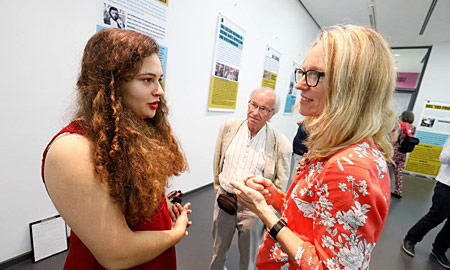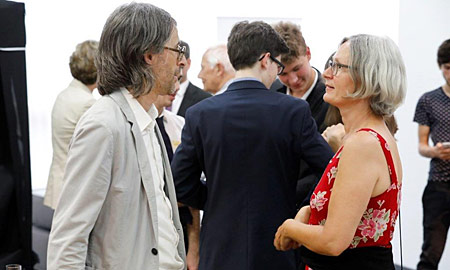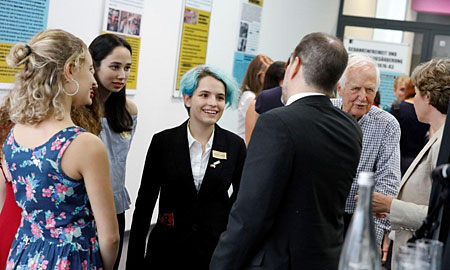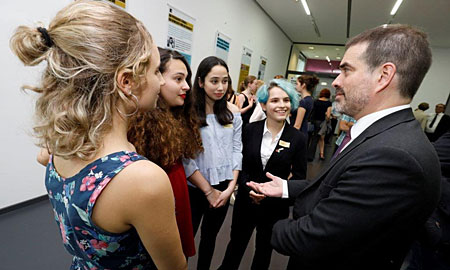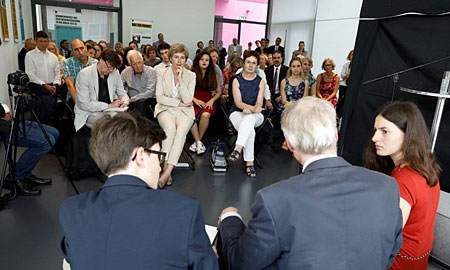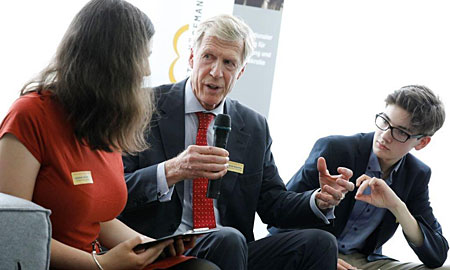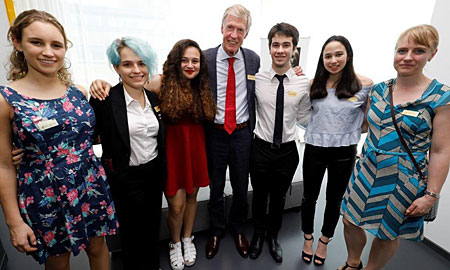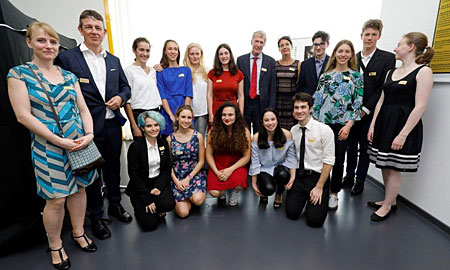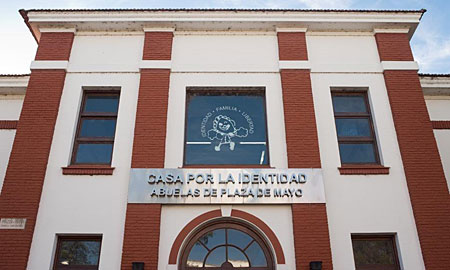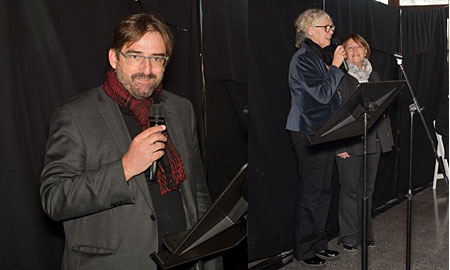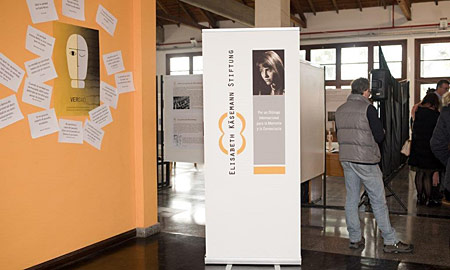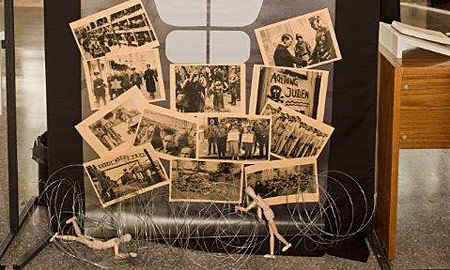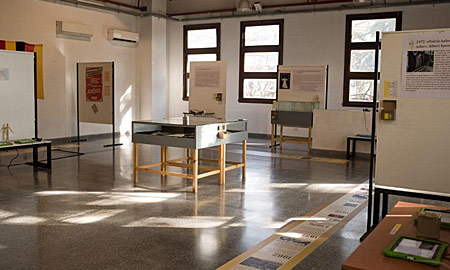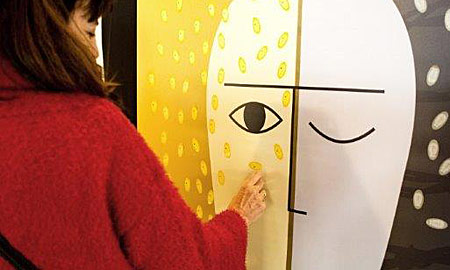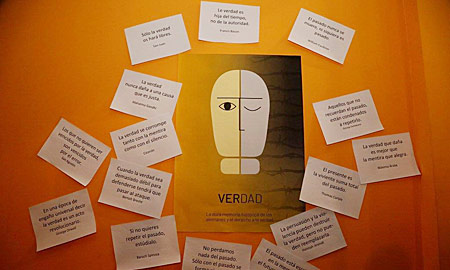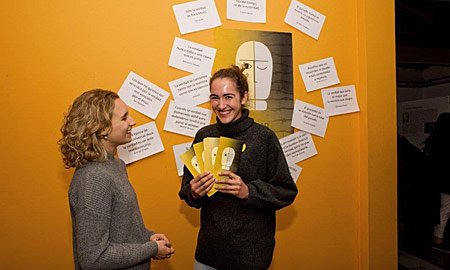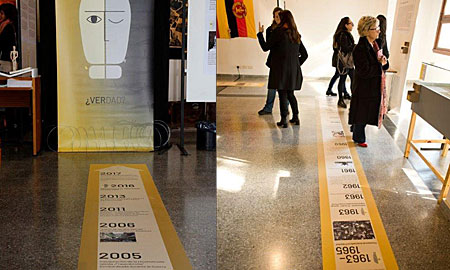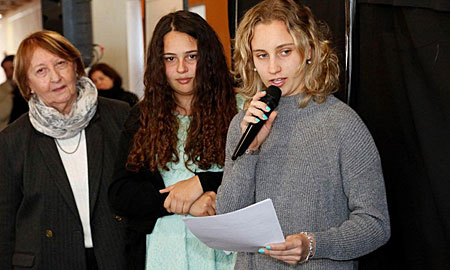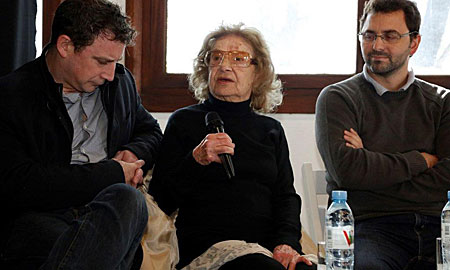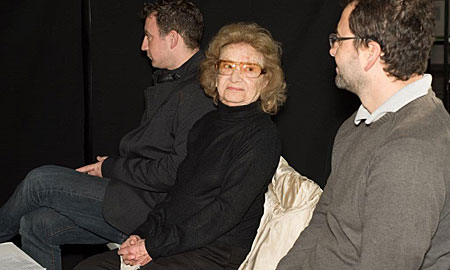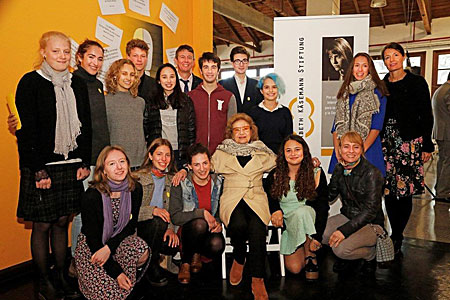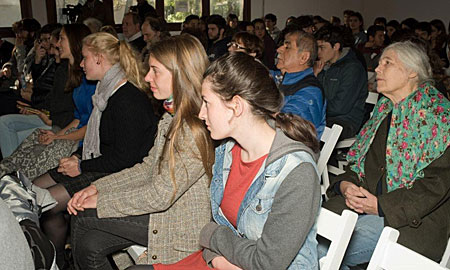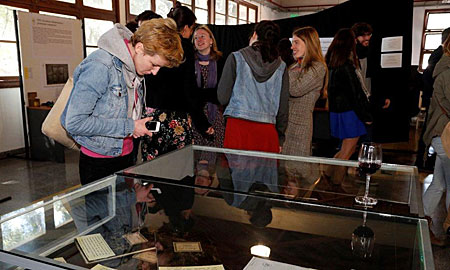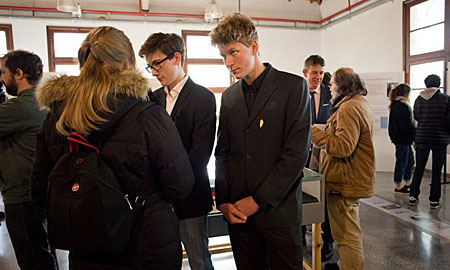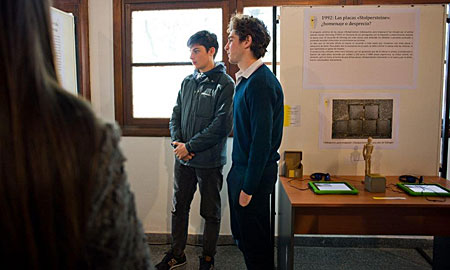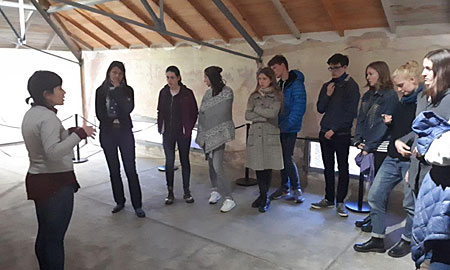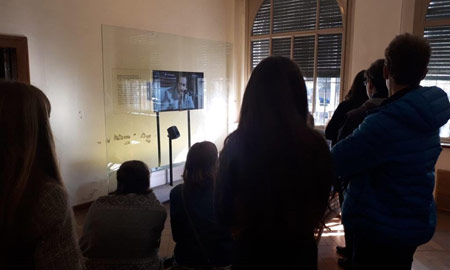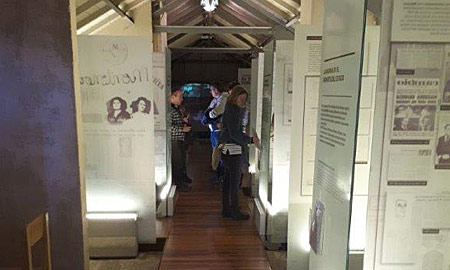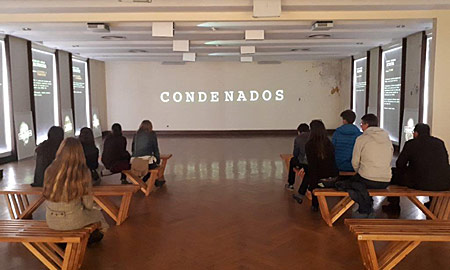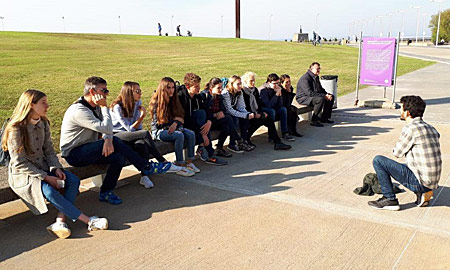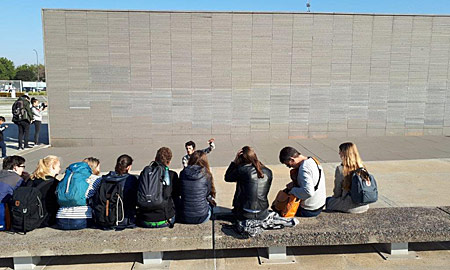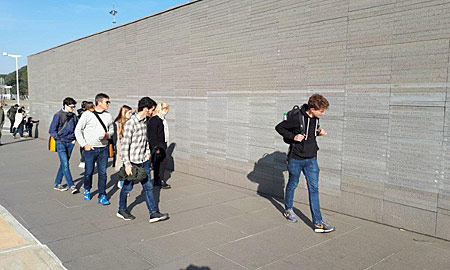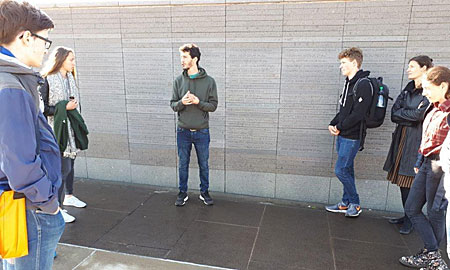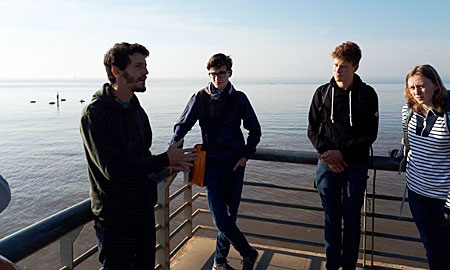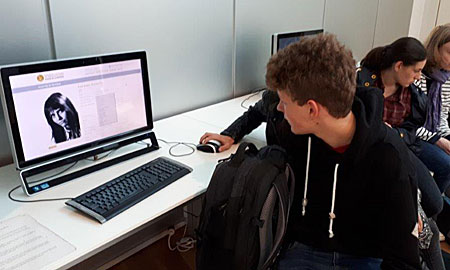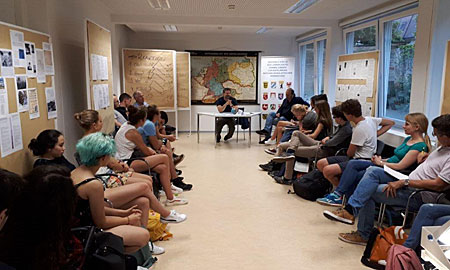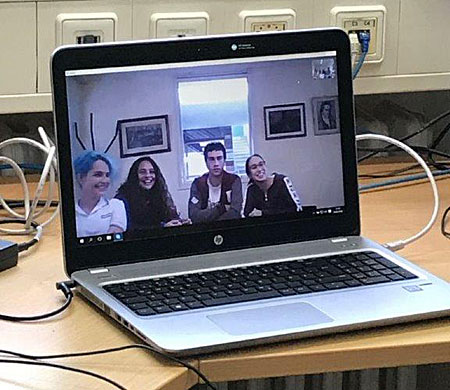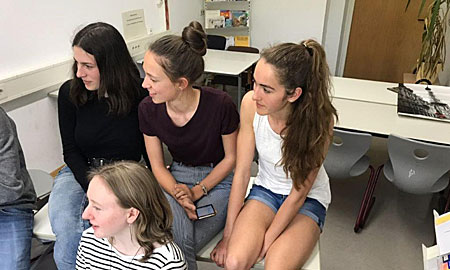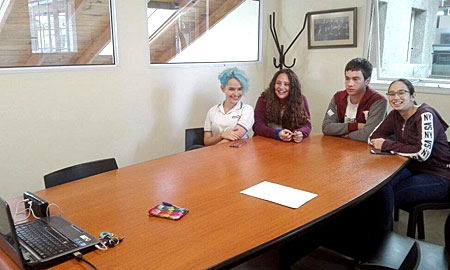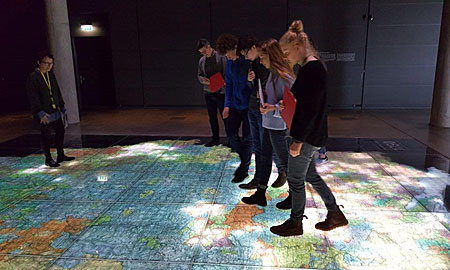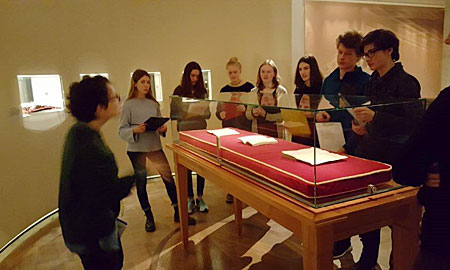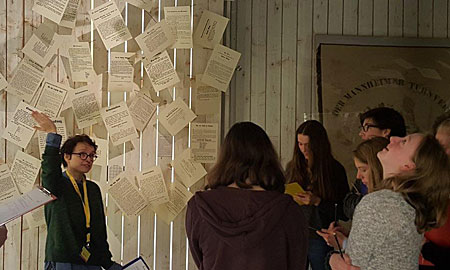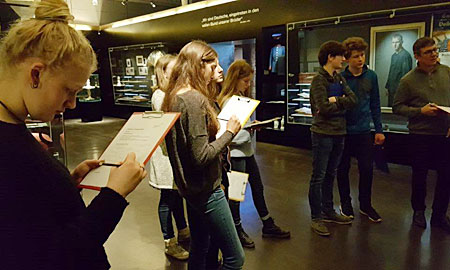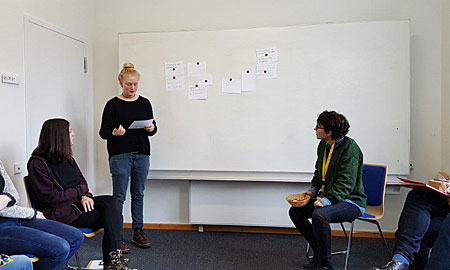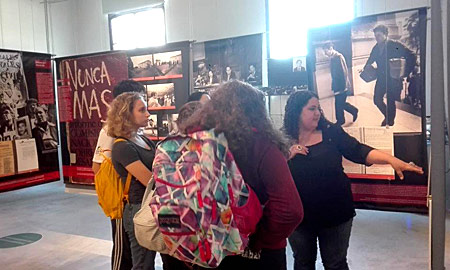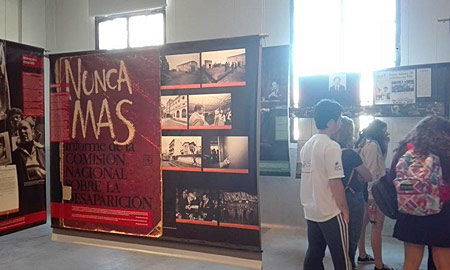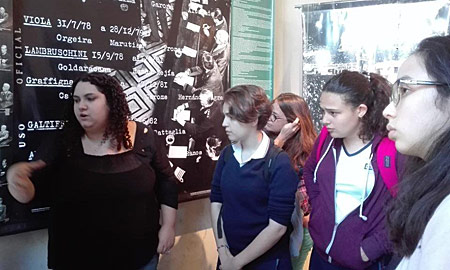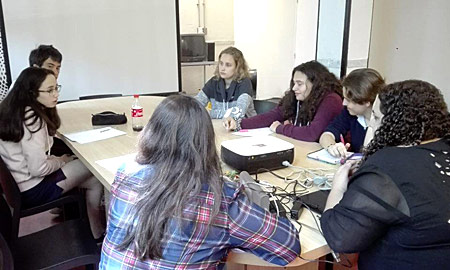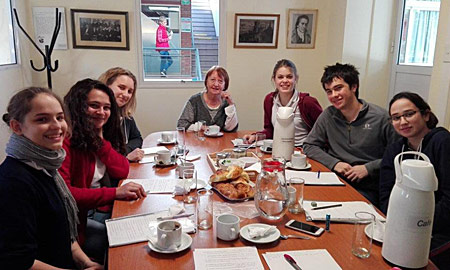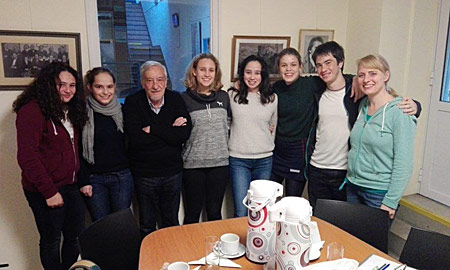Certificate for the successful participation in the school project of the Elisabeth Käsemann Foundation 2017/18
Report on the 2017/18 school project of the Elisabeth KÄsemann Foundation
In June 2018 the first school project of the Elisabeth Käsemann Foundation concluded with great success. Five Argentinian and eight German school students presented their exhibitions on the subject of human rights in Stuttgart and Buenos Aires, which they had prepared throughout the year as a contribution to their graduation exams.
Presentation of the exhibition
“Keine Worte. Gedanken- und Meinungsfreiheit in Schule und Musik in Buenos Aires, Argentinien, in den Jahren 1976–83”
“No Words. Freedom of Thought and Expression in School and Music in Buenos Aires, Argentina, in 1976–83”
On 11 June 2018 the students from the Pestalozzi School in Buenos Aires opened their exhibition, presented in German, in the House of History Baden-Württemberg in Stuttgart.
Welcome address by Sabine Aichholz, who represented the Ministry of Culture of Baden-Württemberg at the opening event.
The students from the Pestalozzi School titled their exhibition “No Words”. It examines the right to freedom of thought and expression at their own school and at the Colegio Nacional in Buenos Aires during the Argentinian military dictatorship. As part of the project the students familiarized themselves with the subject of human rights, interviewed witnesses of that time period, visited archives and learned how to design an exhibition.
With their interviews of contemporary witnesses, the Argentinian students have created new historical resources. Among others, they spoke with Juan Ernesto Aleman about the freedom of expression. Aleman had been state secretary in the ministry of economy during the rule of the dictatorship. His father Ernesto Aleman founded the Pestalozzi School in 1934 as a reaction to the National Socialist control of the German schools in Argentina.
Argentinian students in conversation with Esteban Morelli, Deputy Consul General of the Republic of Argentina. The connection with the present was made by the students through organizing a survey that asked about the meaning of freedom of expression today. The results were presented in the exhibition.
On the occasion of the opening event, the students from the Wildermuth School Nora Winker and Valentin Petri interviewed Dr. Axel Smend. Smend is chairperson of the board of trustees of the Foundation 20 July 1944 (Stiftung 20. Juli 1944) in Berlin. His father belonged to the resistance group that devised the plot against Hitler on 20 July 1944, and was murdered by the National Socialist dictatorship on 8 September 1944.
Participants and teachers of the school project together with Dr. Axel Smend.
Presentation of the exhibition
“VERDAD. La dura memoria histórica de los alemanes y el derecho a la verdad” “TRUTH. The difficult historical remembrance in Germany and the right to truth”
On 22 June 2018 the students from the Wildermuth School in Tübingen showed the results of their work in Spanish language at the Casa por la Identidad – Espacio Memoria y Derechos Humanos in Buenos Aires (House of Identity – Space for Remembrance and Human Rights). The Casa por Identidad is situated on the grounds of the former most significant Argentinian detention and torture center Escuela de Mecánica de la Armada (ESMA) and home to the internationally renowned organization Grandmothers of Plaza de Mayo (Abuelas de Plaza de Mayo).
Daniel Krull, envoy of the German Embassy in Argentina, carried greetings from the German Ambassador Jürgen Christian Mertens. Alejandra Naftal, director of the Museo Sitio de Memoria ESMA, welcomed the audience.
In their exhibition the students from the Wildermuth School examined the process of dealing with the National Socialist past in Germany and – in terms of the right to truth – raised the question whether the German society has been fully informed about its National Socialist past. In recent decades the right to truth has been used in international jurisdiction as an addition to the codified human rights.
The symbol of the two eyes
As part of the exhibition a face with a closed and an open eye symbolizes the two attitudes of dealing with the past: facing or denying it. Using differently colored sticky notes, the visitors of the exhibition were invited to rate whether the process of dealing with the past in Germany has been successful or not.
Timeline
A timeline marks the relevant moments in the German process of dealing with its past.
Interview with Aida Rosenfeld
On the occasion of the opening event, the Argentinian students from the Pestalozzi School Natasha Boroda and Camila Orozco de la Hoz interviewed Aida Rosenfeld, her grandson Sebastián Rosenfeld (on the left in the picture) and Leonardo Fossati Ortega (on the right, wearing glasses). Sebastián was born in the clandestine detention and torture center ESMA. His parents were killed by the Argentine dictatorship. Only when Sebastián was five years old his grandmother found out about his whereabouts. Leonardo was born in 1977, also in a clandestine detention center. While his parents where killed by the military dictatorship too, he was adopted by a member of the military. He only found out about his real identity in 2004.
Aida Rosenfeld and the German and Argentinian participants of the school project of the Elisabeth Käsemann Foundation.
Impressions of the presentation of the exhibition on 22 June 2018
Stages of the 2017/18 school project of the Elisabeth KÄsemann Foundation
Throughout the school year 2017/18 different activities took place within the context of the school project of the Elisabeth Käsemann Foundation.
Museo Sitio de Memoria ESMA, Buenos Aires, 21 June 2018
The two groups of German and Argentinian school students visited the Museo Sitio de Memoria ESMA. The Escuela de Mecánica de la Armada (ESMA) was an educational institution of the navy that also served as an important clandestine detention and torture center during the Argentinian dictatorship (1976–1983). The building of the former officers’ casino on the grounds of the ESMA has been turned into a memorial site and opened 2015 as the Museo Sitio de Memoria ESMA.
Parque de la Memoria, Buenos Aires, 20. Juni 2018
The students from the Wildermuth School in Tübingen, Germany, visiting the memorial site Parque de la Memoria in Buenos Aires.
Walking past the names of thousands of victims of the Argentinian dictatorship (1976–1983), among them Elisabeth Käsemann. Most of the victims were under the age of 30.
Parque de la Memoria in Buenos Aires is situated at the Rio de la Plata. Many victims were thrown out alive from helicopters into the Rio de la Plata in order to vanish forever. One of them was 14-year-old Pablo Miguez. A sculpture of him can be seen in the background of this picture, out in the Rio de la Plata.
An insight into the digital archive of the Parque de la Memoria. There is a digital file for every identified victim.
Central Office of the State Justice Administration for the Investigation of National Socialist Crimes, Ludwigsburg, 12 June 2018
The Argentinian students from the Pestalozzi School in Buenos Aires and the German students from the Wildermuth School in Tübingen jointly participated in a workshop at the Central Office of the State Justice Administration for the Investigation of National Socialist Crimes in Ludwigsburg, Germany. The director of the Central Office, Chief Public Prosecutor Jens Rommel, explained the work of the investigation office to the students.
Buenos Aires – Tübingen, 24. April 2018
Buenos Aires – Tübingen: Skyping between the worlds.
House of History Baden-Württemberg, Stuttgart, 20 February 2018
Workshop at the House of History Baden-Württemberg where the students from the Wildermuth School learned how to design a historical exhibition.
Memoria Abierta, Buenos Aires, 25. October 2017
The visit to the Argentinian human rights organization Memoria Abierta gave the participants of the school project valuable insights into the processing of government-led human rights crimes.
Pestalozzi School, Buenos Aires, 18. August 2017
The Argentinian students of the school project interviewed Dr. Luisa Wettengel, member of the group of German victims of the Argentinian military dictatorship and teacher at the Pestalozzi School at the time of the dictatorship.
Pestalozzi School, Buenos Aires, 11. August 2017
Jorge Fasce, former director of the Pestalozzi Primary School in Buenos Aires (1970–1983), talked to the students about his experiences as a director of the school during the military dictatorship.
Funded with funds from the Protestant Church Development Service
With the kind support of the Foreign Office of the Federal Republic of Germany
